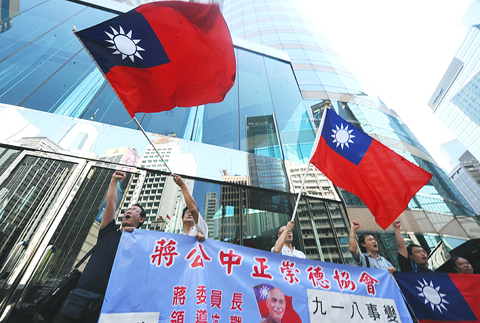|
Ma following Beijing’s lead over
Diaoyutais: analysts
By Shih Hsiu-chuan
Staff Reporter
Sunday, Sep 19, 2010, Page 3

A group of protesters wave Taiwanese flags as
they demonstrate near the Japanese consulate in Hong Kong on Friday in
opposition to Tokyo’s claims over the Diaoyutai islands, also known as the
Senkaku islands in Japan.
PHOTO: AFP
Relations between Taiwan and Japan have been put to the test as the
long-standing thorny issue of the Diaoyutai islands came to the fore recently
when on Sept. 7, two Japanese patrol boats were involved in a minor collision
with a trawler from China, analysts said yesterday.
On the sidelines of a symposium on contemporary issues concerning China and
Japan yesterday, Lee Chia-chin (李嘉進), a senior National Security Council
advisor, said that “despite its complexity, Taiwan couldn’t remain silent when
the issue came up.”
Lee was commenting on remarks made recently by Japanese Representative to Taiwan
Tadashi Imai, who was summoned on Monday by Deputy Minister of Foreign Affairs
Shen Lyu-shun (沈呂巡). The summons was issued ahead of a protest on Tuesday in
which two Taiwanese set sail for the disputed islands in a gesture meant to
reject Japan’s claim of sovereignty over the archipelago.
Imai told the Kyodo News agency that the move “could have an adverse effect on
Japan-Taiwan relations.”
The summons triggered speculation that Taiwan had joined hands with China
against Japan over the Diaoyutais issue. Although two Taiwanese fishing ships
were detained by Japan on Sept. 7 and Sept. 8 for alleged illegal fishing,
Taiwan did not call in the Japanese envoy until Sept. 13. The summons was issued
only after Beijing had called in Tokyo’s ambassador to China last Sunday for a
fourth time over the Chinese trawler collision.
The protest voyage initiated by Huang Hsi-lin (黃錫麟) — a leader of the Chung Hwa
Baodiao Alliance who is running for Sinbei City councilor in November — was
escorted by 12 vessels from the Coast Guard Administration. This intrigued some
political observers, leading them to question the Chinese Nationalist Party (KMT)
government’s motives.
Noting Japan’s response to the Taiwanese government’s handling of the issue, Fan
Shih-ping (范世平), director of National Taiwan Normal University’s Graduate
Institute of Political Science, said the KMT government “lacked a comprehensive
consideration of the repercussions stemming from how it dealt with the issue on
Taiwan-Japan relations.”
Saying that “Japanese are endowed with reticence,” Fan added that the extent of
the Japanese reaction reflects how concerned Tokyo is about President Ma Ying-jeou’s
(馬英九) foreign policy favoring China over Japan.
Although the Ma government just repeated its established stance on the disputed
Diaoyutai islands, over which Taiwan also claims sovereignty, Fan said the
government chose a bad time to declare its position.
“I did not see the need to call Imai in at that time and it could have restated
its stance on the issue when the Sino-Japanese tension receded,” he said. “But
it’s understandable that the government had to allow the protest [by Huang] and
dispatch vessels to protect the protestors because Taiwan is a democracy.”
After Tuesday’s protest, China’s State Council Taiwan Affairs Office
spokesperson Fan Liqing (范麗青) praised the move, saying that “maintaining
sovereignty over the Diaoyutai islands amid the encounter is in the common
interests of compatriots on both sides of the Strait.”
Although the timing might be coincidental, Fan Shih-ping said the remarks by Fan
Liqing — coupled with the first cross-strait air-sea rescue exercise between
Kinmen County and China’s Xiamen on Thursday — could make Japan worry about
relations with Taiwan, a traditional ally on many issues.
In the government’s defense, Lee said “the government has never made contact
with China about the Diaoyutai islands issue, nor has it consulted with China.”
Lee added that the Ma government was hoping to better understand speculation
that the collision was organized by the Chinese government in response to joint
US-Japan exercises to be held in December.
Toru Kurata, an associate professor specializing at Asian studies at the School
of International Studies at Japan’s Kanazawa University, said the Japanese do
not have much sympathy for the Chinese, who reacted strongly to the case, but
thought highly of the Taiwanese, who acted rather calmly.
He said the issue should be resolved by international law.
Saying that he did not think Taiwan would side with China against Japan because
of the Diaoyutais, Kurata was of the opinion that “Taiwan and China might have
common interests on this matter, but they still have their own concerns on many
others.”
|
![]()
![]()
![]()